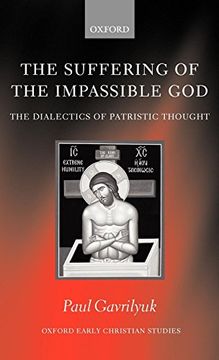Share
The Suffering of the Impassible God: The Dialectics of Patristic Thought (Oxford Early Christian Studies) (in English)
Paul Gavrilyuk (Author)
·
Oup Oxford
· Hardcover
The Suffering of the Impassible God: The Dialectics of Patristic Thought (Oxford Early Christian Studies) (in English) - Paul Gavrilyuk
$ 249.71
$ 312.14
You save: $ 62.43
Choose the list to add your product or create one New List
✓ Product added successfully to the Wishlist.
Go to My WishlistsIt will be shipped from our warehouse between
Friday, June 21 and
Monday, June 24.
You will receive it anywhere in United States between 1 and 3 business days after shipment.
Synopsis "The Suffering of the Impassible God: The Dialectics of Patristic Thought (Oxford Early Christian Studies) (in English)"
The Suffering of the Impassible God provides a major reconsideration of the notion of divine impassibility in patristic thought. The question whether, in what sense, and under what circumstances suffering may be ascribed to God runs as a golden thread through such major controversies as Docetism, Patripassianism, Arianism, and Nestorianism. It is commonly claimed that in these debates patristic theology fell prey to the assumption of Hellenistic philosophy about the impassibility of God and departed from the allegedly biblical view, according to which God is passible. As a result, patristic theology is presented as claiming that only the human nature of Christ suffered, while the divine nature remained unaffected. Paul L. Gavrilyuk argues that this standard view misrepresents the tradition. In contrast, he construes the development of patristic thought as a series of dialectical turning points taken to safeguard the paradox of God's voluntary suffering in the flesh. For the Fathers the attribute of divine impassibility functioned in a restricted sense as an apophatic qualifier of all divine emotions and as an indicator of God's full and undiminished divinity. The Fathers at the same time admitted qualified divine passibility of the Son of God within the framework of the Incarnation. Gavrilyuk shows that the Docetic, Arian, and Nestorian alternatives represent different attempts at dissolving the paradox of the Incarnation. These three alternatives are alike in that they start with the presupposition of God's unrestricted impassibility: the Docetic view proposes to give up the reality of Christ's human experiences; the Arian position sacrifices Christ's undiminished divinity; while the Nestorian alternative isolates the experiences and sufferings of Christ's humanity from his Godhead. In contrast to these alternatives, the mind of the Church succeeded in keeping God's transcendence and undiminished divinity in tension with God's intimate involvement in human suffering. It is precisely because God's divinity and transcendence are never lost in suffering that the Incarnation becomes a genuine act of divine compassion, capable of transforming and healing the human condition.
- 0% (0)
- 0% (0)
- 0% (0)
- 0% (0)
- 0% (0)
All books in our catalog are Original.
The book is written in English.
The binding of this edition is Hardcover.
✓ Producto agregado correctamente al carro, Ir a Pagar.

